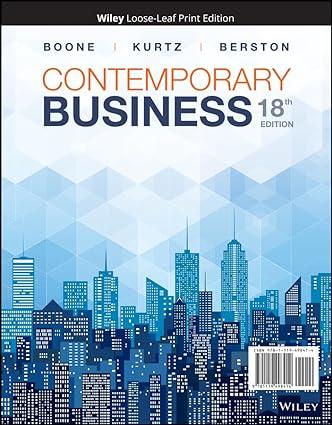S.C. Johnson & Son, makers of Windex and Pledge, is a family-owned business currently in its fifth
Question:
S.C. Johnson & Son, makers of Windex and Pledge, is a family-owned business currently in its fifth generation of leadership. An often overlooked form of business ownership, family-owned businesses surround us—from your neighborhood mom-and-pop stores to corporate giants like S.C. Johnson, Walmart, and Ford.
According to a Harvard Business School study, 70% of family businesses either fail or are sold before the second generation of ownership even gets a chance to succeed its founders. The biggest reason for lack of succession is commonly referred to as “business divorce,” or the separation of its business owners. The reason? Poor management and, even worse, long-term succession and strategic planning. Other conflicts can include money, nepotism (favoring relatives), and infighting over succession of power from one generation to the next.
Are senior family members cannibalizing the very businesses they took years to build? Many successful business owners have the means to provide for college—which creates a highly educated, next generation of family members. With levels of education superior to their small business-owning parents, children choose careers commensurate with education levels. In addition, family business parents may avoid encouraging or pressuring children to take over due primarily to more education and career choices available than in previous generations.
Many newly minted college graduates may prefer the opportunity to make a difference or change the world—and that might not include working as a middle-level manager of what can sometimes amount to a traditional, not-so-glamorous, small-town family business in an “old economy” industry.
In the past, next-generation family members worked years before gradually taking over the business from a previous generation.
Today's family members are impatient to advance their own careers and to make an impact on society. For the 30% of family businesses that do make it beyond the second generation of ownership—there's something to be said about the longevity of “keeping it in the family.”
Questions for Critical Thinking
1. What do you believe are additional reasons to support the statistic that 70% of family businesses fail or are sold before the second generation of ownership gets a chance to succeed? Discuss why next-generation family members may not be qualified or suited to take over the business.
2. Do the odds of the long-term survival of a family business have more to do with the many career and educational opportunities available today and less to do with the quality of succession and long-term strategic planning? What are other contributing factors?
Step by Step Answer:

Contemporary Business
ISBN: 9781119498414
18th Edition
Authors: Louis E. Boone, David L. Kurtz, Susan Berston





